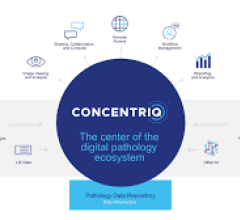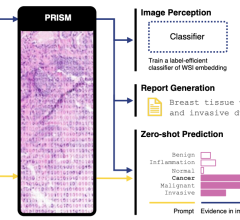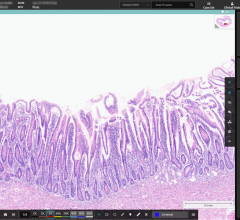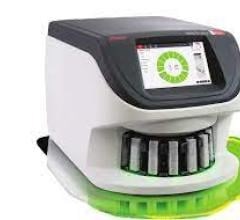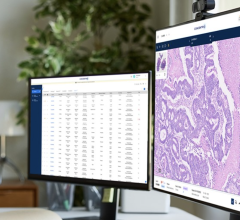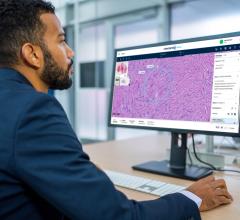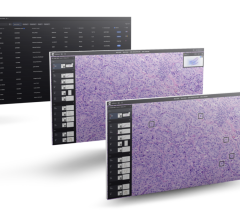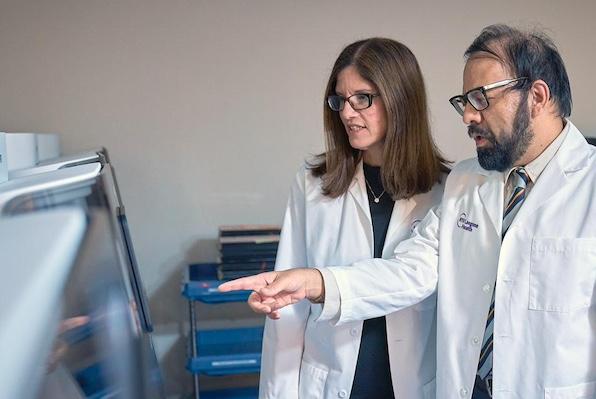
Dr. Joan F. Cangiarella and Dr. Syed T. Hoda observe the new digital scanners, which promise to speed diagnosis and treatment for many diseases through increased efficiency. (Credit: NYU Langone)
Oct. 10, 2024 — NYU Langone Health recently launched a digital pathology program, transforming disease diagnosis from microscopes to high-definition images, shareable in real time across the hospital network. This change offers unprecedented clarity for viewing human tissue samples, shorter diagnosis time and enhanced collaboration within a field that has historically been a vital but unseen engine of patient care.
“Since the dawn of pathology, our work has involved being hunched over looking at slides in the microscope in our offices after they’ve been manually delivered to us,” said Syed T. Hoda, MD, director of Digital Pathology, Clinical and Bone and Soft Tissue Pathology at NYU Langone. “As of this week, images can get to the right pathologist in real time, no matter where a patient is being treated in our network.”
This technological advancement comes at a crucial time. The nation is facing a pathologist shortage while disease rates are skyrocketing, with only a small number of pathologists confirming diagnoses that affect millions of patients daily. Allowing pathologists greater workload efficiency without the risks associated with physical slides — such as storage issues, slide degradation, and time delays — builds more sustainable healthcare infrastructure.
Moreover, the initiative opens new job opportunities, with the hospital hiring 24 digital pathology coordinators, creating an entirely new career path in healthcare.
Joan Cangiarella, MD, vice chair of clinical operations in the Department of Pathology at NYU Grossman School of Medicine, emphasized the volume and intensity of pathologists’ work. “Our team scrutinizes samples for patients we’ll never meet, agonizing over microscopic details that can change lives. Now, with digital pathology, we can perform this work at a much higher level that allows us to further elevate the exceptional care we already provide.”
Beyond improving efficiency, digitizing medical images lays the groundwork for AI-assisted diagnostics.
“As one of the first U.S. health systems to fully embrace digital pathology, NYU Langone is advancing disease detection for its patients and, by leveraging AI, igniting a practice shift that could alleviate a looming healthcare bottleneck,” said Nader Mherabi, executive vice president and vice dean, chief digital and information officer at NYU Langone.
Expanding on this potential, Sean Hacking MD, director of Digital Pathology Research, explained: “This program will diversify our diagnostic toolbox. Digital images will help power AI models we are building to identify cancer and other diseases at the earliest, most relevant time for patients, which can have a huge impact on the choices they have for treatment.”
The digital program aims to shorten the time from test to treatment, enhance collaboration among medical teams, and potentially allow pathologists to have a greater voice at the bedside when patients have questions about their diagnosis. Its impact is already being felt across the hospital.”
NYU Langone Health has a multi-year partnership with Philips to implement technology, including digital pathology. Martijn Hartjes, clinical informatics business leader at Philips echoes Mherabi’s assessment of the digital scanners being a launchpad to augment pathologists’ capabilities.
“NYU Langone Health is setting a new standard in precision diagnosis and treatment by embracing digital pathology and switching to fully digital workflows. With digital pathology, other labs have experienced efficiency gains of up to 15% to 25% per case,” said Hartjes. “Digital pathology also enables the ability to integrate AI, which can further improve efficiency and open new possibilities for disease detection. At Philips, we recognize the challenges of transitioning from an analog to a digital workflow, so our focus is on delivering technology and services that make the transition seamless, and empowering clinicians with the tools they need to deliver better care to more patients.”


 January 23, 2025
January 23, 2025 
